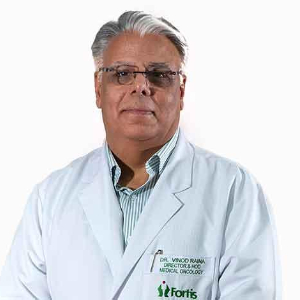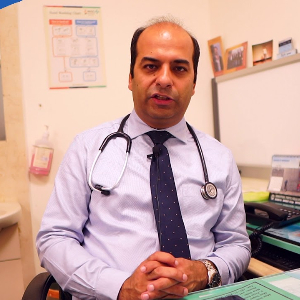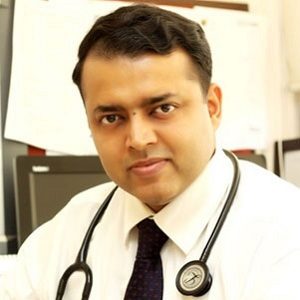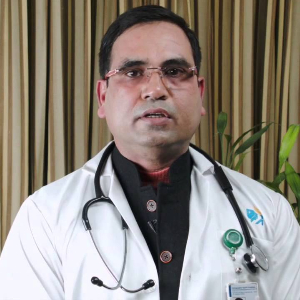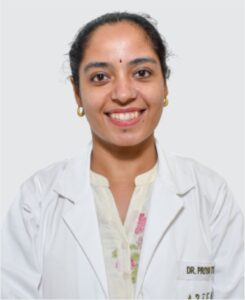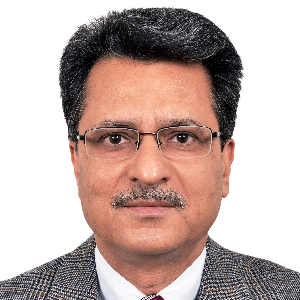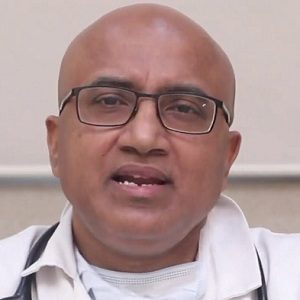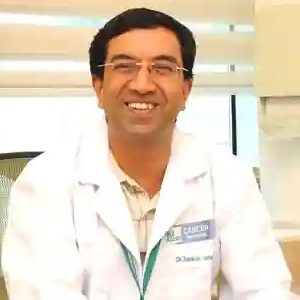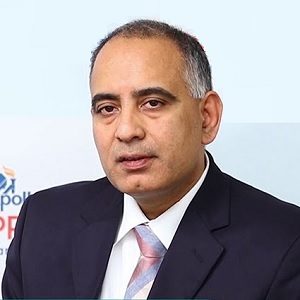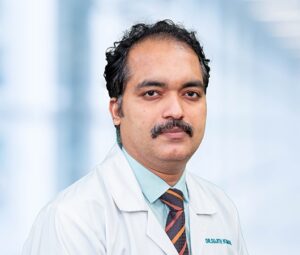Best Doctors in India for Adenocarcinoma Treatment
- Medical Oncologist, Gurugram, India
- Over 40 years’ experience
- Fortis Memorial Research Institute
Profile Highlights:
- Dr. Vinod Raina is a distinguished figure in the field of Medical Oncology in India, with over 40 years of exemplary experience. He is currently associated with Fortis Memorial Research Institute in Gurugram where he is functioning as the Director and Head of Medical Oncology and Hematology.
- His primary expertise lies in Chemo treatment and is the first to perform high-dose chemo in India. He also performed the first peripheral blood BMT in India.
- Additionally, Dr. Raina possesses specialized expertise in treating a wide spectrum of cancers including Breast Cancer, Lung Cancer, Gastrointestinal Cancer, Urological Cancer, Gynecological Cancer, Lymphoma, and Myeloma. His contributions extend to performing approximately 400 BMTs, enhancing treatment options for various cancers.
- Medical Oncologist, Gurugram, India
- 15+ years’ experience
- Fortis Memorial Research Institute
Profile Highlights:
- Dr. Ankur Bahl is a distinguished Senior Director of Medical Oncology at Fortis Memorial Research Institute (FMRI), Gurugram, with over 15 years of extensive experience in the field of oncology.
- Dr. Bahl completed his MBBS and MD in Medicine from Maulana Azad Medical College, Delhi. He further specialized by earning a DM in Medical Oncology from the prestigious All India Institute of Medical Sciences (AIIMS), New Delhi.
- His clinical expertise encompasses a broad range of oncology treatments, including immunotherapy, targeted therapies combined with chemotherapy, hormonal therapy, as well as supportive and palliative care.
- Top Medical Oncologist | Apollo Hospital, New Delhi, India
- 20+ Years Experience
- Indraprastha Apollo Hospital, New Delhi
Profile Highlights:
- Dr. Manish Singhal is a highly experienced medical oncologist based in South Delhi, with a distinguished career spanning over 20 years. Currently, he is practicing as a Consultant in Medical Oncology at Apollo Hospital, New Delhi.
- Dr. Singhal is widely recognized as one of the top medical oncologists in the region, celebrated for his expertise in delivering personalized treatment plans tailored to each patient’s unique needs.
- Specializing in the diagnosis and treatment of various cancers, including breast, lung, oral, melanoma, and osteosarcoma, Dr. Singhal offers comprehensive care that includes advanced treatments like BMT, hormone treatment for prostate cancer, and chemotreatment for hematological malignancies.
- He employs state-of-the-art diagnostic techniques to ensure precise diagnoses, enabling him to craft individualized treatment strategies that optimize efficacy while minimizing side effects.
- Top Medical Oncologist | Apollo Hospital, New Delhi, India
- 20+ Years Experience
- Indraprastha Apollo Hospital, New Delhi
Profile Highlights:
- Dr. P.K. Das is a highly esteemed medical oncologist in Delhi, renowned for his extensive experience spanning over 20 years.
- His practice is dedicated to providing comprehensive and compassionate care to patients grappling with various types and stages of cancer.
- Specializing in medical oncology, Dr. Das possesses profound expertise in diagnosing and treating cancers affecting diverse organs including breast, lung, colon, prostate, pancreas, liver, and kidney.
- Medical Oncologist: Artemis Hospital
- Over 10 Years' Experience
- Artemis Hospital, Gurgaon
Profile Highlights:
- Dr. Priya Tiwari is a distinguished Medical Oncologist based at Artemis Hospitals in Gurugram, renowned for her expertise in comprehensive cancer care.
- She has 10 years of experience.
- Her medical education includes an MD in Medicine and a DM in Medical Oncology from AIIMS, alongside an MBBS degree from IMS, BHU, where she was a gold medalist.
- Medical Oncologist, Gurugram, India
- Over 30 years’ experience
- Medanta-The Medicity, Gurgaon
Profile Highlights:
- Dr. Ashok Kumar Vaid is a reputed Medical Oncologist in India with expertise in the treatment of blood, lung, skin, breast, and gastrointestinal cancers.
- He is famously known for performing among the first 25 BMTs in a private hospital in India.
- Dr. Vaid’s primary area of focus lies in Leukemia, Lymphoma, Solid tumors, and the treatment of organ-specific benign and malignant tumors.
- He prefers to treat his patients using non-surgical and pain-free techniques that include Hormone Medicine, Biological Treatment, Targeted Treatment, and Chemo Treatment.
- Top Medical Oncologist | Apollo Hospital, New Delhi, India
- 15+ Years Experience
- Indraprastha Apollo Hospital, New Delhi
Profile Highlights:
- Dr. Dipanjan Panda is one of the well-known medical oncologists in India, having 15 years of expertise in treating bone and soft tissue cancers and gastrointestinal cancers.
- He is credited with starting the country’s first anticancer departments and PDCC program. Dr. Panda developed a medical oncology unit at Indraprastha Apollo Hospital in New Delhi, in association with the Institute of Liver and Biliary Sciences. He is currently working at Indraprastha Apollo Hospital in New Delhi as a Senior Consultant, Medical Oncology.
- Dr. Panda has written twenty peer-reviewed papers in national and international journals. He has presented numerous talks at global forums.
- Medical Oncologist, Chennai, India
- Over 28 years’ experience
- Apollo Cancer Centre Chennai
Profile Highlights:
- Dr. Sankar Srinivasan is one of the top Medical Oncologists in India with proficiency in cancer management for about 28 years.
- He got certified in Internal Medicine, Medical Oncology, and Hematology from American Board to enhance his skills.
- Dr. Srinivasan is placed in the best 10% of the Hematologists boards.
- He is an active member of several International Medical Association Boards.
- Medical Oncologist and BMT Specialist, Chennai, India
- Over 25 years’ experience
- Apollo Cancer Centre Chennai
Profile Highlights:
- Dr. Raja T is a renowned Medical Oncologist from Tamil Nadu who is currently serving as the Director of Medical Oncology at Apollo Cancer Centre in Chennai.
- He is well proficient in conducting a number of cancer procedures such as Cancer Screening, Chemo Treatment, PICC Line Insertion, BMT, Pap collection, lymphoma, Renal Cell Cancer management, and Head and Neck Tumor.
- Along with his clinical practice, Dr. Raja T is also a renowned veteran who has been the Principal Investigator for several clinical studies, a published author for journals, and a teacher.
- Medical Oncologist, Chennai, India
- Over 12 Years Experience
- Apollo Proton Cancer Centre
Profile Highlights:
- Based in Chennai, Dr. Sujith Kumar Mullapally is a skilled Medical Oncologist who is currently practicing as a Consultant Medical Oncologist at the Apollo Proton Cancer Centre, Chennai.
- Dr. Mullapally is quite versatile as he specializes in a range of oncology specialties. Thoracic Oncology, Neuro-Oncology, Head & Neck Oncology, Genitourinary Oncology and Bone & Soft Tissue Tumors are just a few of his expertise. In addition, he has a great deal of interest in Immuno-Oncology and Preventive Oncology.
- To detect various cancer forms early on, Dr. Mullapally uses cutting edge diagnostic methods including biopsies and imaging tests (X-rays, CT scans).
- As a specialist, Dr. Mullapally is aware of the difficulties in identifying and managing cancer. So as soon as a patient notices symptoms or has worries about their health, he advises them to consult a specialist who can offer more focused treatment.
- Following a diagnosis, Dr. Mullapally develops individualized treatment plans for patients that might involve immuno treatment, chemo treatment, radiation treatment, or surgery. These treatments are intended to minimize adverse effects while optimizing efficacy, and they are customized to meet the specific needs of every patient.
Best Hospitals in India for Adenocarcinoma Treatment
- City: Gurugram, India
Hospital Highlights:
- One of India’s best and largest multi-specialty hospitals, Medanta was built with the aim to bring India to the highest standards of medical care. The hospital has been providing the best medical services to its patients, since its inception, with care, commitment, and compassion.
- Equipped with 1250 beds, the hospital was founded by Dr. Naresh Trehan in the year 2009 with an aim to provide the best medical care at affordable costs. The hospital is spread across 43 acres and includes 45 operation theatres and 350 beds dedicated solely to ICU. The hospital includes over 800 doctors, and more than 22 specialty departments and has a dedicated floor for individual specialty in order to offer the best services under one roof.
- The hospital is considered one of the premier institutes in India for Cardiac Care and includes staffs and members of high caliber. The hospital has 6 distinct centers of excellence.
- City: Gurugram, India
Hospital Highlights:
- Artemis Hospital, established in 2007 in Gurugram, India, is a leading multi-specialty institution known for its excellence in patient care and advanced medical technology, offering comprehensive services across specialties like Cardiology, Oncology, Neurology, Orthopedics etc.
- Renowned for its patient-focused care, Artemis Hospital combines state-of-the-art infrastructure with a team of internationally trained doctors and surgeons, ensuring the highest standards of medical treatment.
- Accredited by JCI and NABH, Artemis Hospital meets global healthcare quality and safety standards, reflecting its commitment to providing compassionate, personalized care.
- The hospital is recognized for utilizing cutting-edge diagnostic and ther*peutic techniques, ensuring patients receive accurate diagnoses and effective treatments tailored to their needs.
- City: Chennai, India
Hospital Highlights:
- The Apollo Proton Cancer Centre in Chennai is the most sought-after private cancer hospital in India. It is an integrated facility that provides cutting-edge, all inclusive cancer treatment to patients all over the globe.
- The hospital is a part of the renowned Apollo Group which has a large network of over 74 hospitals in India and across the globe. Out of the 74 hospitals, 21 of them are cancer centres. However, Apollo Proton Cancer Centre is the only cancer hospital to have JCI accreditation.
- The Centre, which was established on the principles of excellence and expertise, unites a formidable medical staff led by some of the most illustrious figures in cancer treatment.
- The hospital follows the global ASTRO Model Policy. It is the same global policy which is followed by countries like USA, UK, and Europe.
- Apollo Proton Cancer Centre is among the very few hospitals in India to receive patients from First World countries such as USA, Canada, New Zealand, Australia, Singapore, Thailand, etc.
- Apart from that, it is also the first hospital in Chennai to receive patients from several countries like Uzbekistan, Kazakhstan, Turkmenistan, Georgia, Armenia, Azerbaijan, SAARC countries (Bangladesh, Nepal, Sri Lanka, Maldives, Bhutan, Afghanistan, and Pakistan), South Africa, Turkey, Egypt, etc.
- In fact, there is a dedicated team at the Apollo Proton Cancer Centre that serves only international patients. Thus, on a monthly basis, the Centre receives patients from across 32 countries.
- Moreover, there are certain treatments in Apollo Proton Cancer Centre that are not available in any other centre. APCC addresses all types of possible cancers that are usually not covered by any other centre.
- City: New Delhi, India
Hospital Highlights:
- Over the last 33 years, the Fortis Escorts Heart Institute has set new standards in cardiac treatment with groundbreaking research. It is now known around the world as a centre of expertise for Cardiac Bypass Surgery, Interventional Cardiology, Non-invasive Cardiology, Paediatric Cardiology, and Paediatric Cardiac Surgery.
- The hospital has cutting-edge laboratories that perform a wide range of diagnostic tests in Nuclear Medicine, Radiology, Biochemistry, Haematology, Transfusion Medicine, and Microbiology.
- Fortis Escorts Heart Institute boasts a diverse group of bright and experienced doctors who are backed up by a team of highly qualified, experienced, and devoted support professionals as well as cutting-edge equipment such as the recently installed Dual CT Scan.
- Approximately 200 cardiac doctors and 1600 personnel currently collaborate to manage over 14,500 admissions and 7,200 emergency situations each year. The hospital now has a 310-bed infrastructure, as well as five cath labs and a slew of other world-class amenities.
- City: Gurugram, India
Hospital Highlights:
- Fortis Memorial Research Institute (FMRI) is a premier multi-super-specialty, quaternary care hospital, known for its exceptional international faculty, top-tier clinicians, super-sub-specialists, and specialized nurses, all supported by cutting-edge technology.
- It is the flaship hospital of Fortis Healthcare Limited, part of IHH Healthcare Berhad, a leading integrated healthcare services provider in India. As one of the country’s largest healthcare organizations, Fortis operates 28 healthcare facilities with over 4,500 operational beds (including O&M facilities) and more than 400 diagnostic centers (including joint ventures).
- Recognized as one of the top hospitals in India, FMRI serves as a leading referral center and aspires to be the ‘Mecca of Healthcare’ for India and beyond. Its 11-acre campus is a testament to its commitment to providing world-class healthcare.
- Accredited by JCI and NABH, FMRI is dedicated to maintaining the highest standards of healthcare quality and safety, ensuring that every patient receives the best possible care. The hospital’s reputation is further enhanced by its state-of-the-art facilities and innovative medical practices.
- City: New Delhi, India
Hospital Highlights:
- The Indian Spinal Injuries Center (ISIC), provides state-of-the-art facilities for the management of all types of spinal ailments.
- Staffed with internationally trained, acclaimed, and dedicated spine surgeons, the hospital provides cutting-edge medical & surgical technology. The hospital provides comprehensive management of spinal injury, back pain, spinal deformities, tumors, osteoporosis, etc.
- The hospital performs motion-preserving spine surgeries including disc replacement and dynamic fixation, and minimally invasive spine surgeries such as endoscopic disc excision.
- The orthopedic service of the hospital covers all orthopedic ailments including trauma, joint diseases & replacements, oncology, pediatric orthopedics & upper limb ailment.
- City: Faridabad
Hospital Highlights:
In the sprawling city of Faridabad, where healthcare needs are diverse and ever-evolving, one institution has consistently stood out as a beacon of excellence in the field of medicine—Marengo Asia Hospital. Established with a vision to provide world-class healthcare services to the community it serves, Marengo Asia Hospital has emerged as a trusted name synonymous with quality, compassion, and innovation in healthcare.
- City: New Delhi, India
Hospital Highlights:
- Indraprastha Apollo Hospital is a 700-bedded multispecialty hospital in the heart of the capital of India. It is a part of Apollo Hospital group, one of India’s most reputed healthcare chains. Indraprastha Apollo Hospital has been accredited by Joint Commission International, making it the first internationally accredited hospital in the country in 2005.
- There are 52 specialties in the hospital with one of the best cardiology centers in the country. The hospital is also equipped with State of the art infrastructure facilities with the largest Sleep Lab in Asia and the largest number of ICU bed facilities in India.
- The latest and highly advanced technologies that are installed in the hospital include Da Vinci Robotic Surgery System, PET-MR, PET-CT, Cobalt-based HDR, Brain Lab Navigation System, Tilting MRI, Portable CT scanner, 3 Tesla MRI, 128 Slice CT scanner, DSA Lab, Endosonography, Hyperbaric Chamber and Fibro scan.
- City: New Delhi, India
Hospital Highlights:
- One of the well-regarded providers in India committed to the highest standards of clinical excellence and patient care, Max Super Specialty Hospital is a part of Max Healthcare, which is the second-largest healthcare chain in India. Regarded as one of the most well-regarded healthcare providers in the country, Max Super Specialty Hospital is committed to the highest standards of clinical excellence as well as patient care. The hospital is also equipped with the latest technology as well as cutting-edge research. The hospital is known to deliver and ensure the highest level of patient care.
- The hospital has more than 500 beds and offers treatment for over 35 specialties. The hospital also holds the credit of having installed the first Brain Suite in Asia. This is a highly advanced Neurosurgical machine that allows MRI to be taken while surgery is ongoing.
- Other advanced and latest technologies are also installed in the hospital such as the 1.5 Tesla MRI machine, 64 Slice CT Angiography, 4D ECHO, LINAC, and 3.5T MRI machine.
- City: Kolkata, India
Hospital Highlights:
- Founded in 2017, the HCG EKO Cancer Centre is a committed, all-inclusive cancer care facility in Kolkata.
- The hospital was collaboratively established by India’s leading cancer care provider HCG (HealthCare Global Enterprises Ltd.), and EKO Diagnostic Pvt. Ltd., a top diagnostic and imaging chain in Eastern India.
- With 88 beds, the hospital provides a full spectrum of services including diagnosis, prevention, screening, second opinions, treatment, rehabilitation, follow-up, and palliative care.
- Additionally, the hospital contains a day-care chemotherapy ward, Neutropenic ward, medical ICU, pharmacy, blood bank, and an IPD wing.
- At HCG EKO Cancer Centre Kolkata, a large team of cancer experts with experience in medical oncology, surgical oncology, radiation oncology, hemato oncology, BMT, and nuclear medicine collaborate to offer a variety of treatment options under one roof.
- Furthermore, the hospital is also known for employing the most advanced radiation technology such as, the Radixact, a next-generation TomoTherapy equipment that provides greater radiation delivery precision.
ADENOCACINOMA
Adenocarcinoma is a type of cancer that begins in the gland that lines the insides of one of the organs in the body. This condition can occur in several parts such as your colon, breasts, esophagus, pancreas, lungs, or prostate.
If you are having this condition, there are several treatments that you can consider to slow or stop this disease, such as chemotherapy or surgery. Treatment, as well as survival rates, generally depend on the tumor’s location, stage, size as well as the overall health of an individual.
Symptoms
This condition may occur in several areas of the body, and there is a long list of symptoms.
Lungs : Adenocarcinoma in the lungs can lead to:
- Coughing
- Hoarseness
- Weight loss
- Weakness
- Exhaustion
- Bloody mucus
Breast : Adenocarcinoma in the breast can show up as a lump or unusual growth.
Prostate : In its early stages, prostate cancer shows no symptoms. However, at a later stage, an adenocarcinoma can lead to any of the following:
- Pain when urinating
- Issues with bladder control
- Painful ejaculation
- More frequent urges to urinate at night
- Blood in the semen
Pancreas : Adenocarcinoma in the pancreas can cause:
- Unintended weight loss
- Pain in the back and stomach
- Oily, pale stools
- Itchy skin
Colon : If adenocarcinoma develops in the colon, the following symptoms are likely to occur:
- A sensation that the bowels are full
- Bloody stool
- Rectal bleeding
- Pain in the stomach
- Unexplained weight loss
Brain or skull : If adenocarcinoma develops in the skull, it can lead to the following symptoms:
- Headaches
- Nausea
- Vomiting
- Blurred vision
- Changes in one’s personality
- Unusual sensations in the legs or arms
- Changes in thinking
- Seizures
Causes & risk factors
Adenocarcinomas can develop due to several different reasons. Scientists are still unsure why adenocarcinomas develop in some people but not others.
However, some clear links can be seen between some of the risk factors. The following list will help you know about the risk factors that can lead cancers to develop as well as adenocarcinomas.
Risk factors common to many of these cancers also include a family history of cancer as well as exposure to radiation therapy previously.
Lungs : Smoking tobacco products or being around second-hand smoke are known to be the main risk factors for lung adenocarcinoma.
Some of the other main risk factors include the following:
- Exposure to any harmful toxins in work or home environments
- Having undergone radiation therapy previously, especially in the lungs
Prostate : Several confirmed risk factors for prostate cancers exist, which can also include adenocarcinoma. They generally include the following:
- Age, as the risk of this condition significantly increases once a man reaches the age of 50
- Having a close relative who is suffering from prostate cancer, may double the risk of developing it
- Race and ethnicity, as prostate cancer is known to be more common in men of African American and Caribbean ethnicity
- Geography, as prostate cancer is known to be more common in North America, Australia, northern Europe, as well as the Caribbean
Breasts : The main risk factors for breast adenocarcinoma include the following:
- Sex, as women are more likely to get breast cancer as compared to men
- Age, since the risk is more significant in older adults
- Taking hormone replacement therapy
- Family history as well as genetics
Pancreas : Risk factors for having include adenocarcinoma in the pancreas include:
- Exposure to certain harmful chemicals in metalwork and dry cleaning
- Smoking
- Overweight and obesity
- Age, as the risk increases as age advances
- Gender, as the condition occurs more in men than women
Brain : Some factors which may the risk of adenocarcinoma spreading to the brain include radiation exposure.
A family history of other diseases linked to cancer, such as Li-Fraumeni Syndrome, might increase the risk of brain cancer as well. However, adenocarcinoma is known to commonly spread to the brain from another location.
Colon : Cancers of the colon and rectum, including adenocarcinoma, have several risk factors that may promote their development. These can include the following:
- Being overweight or obesity
- Having sedentary lifestyle
- Regularly consuming too much alcohol
- History of irritable bowel disease
- Having type 2 diabetes
- A diet high in red or processed meats
- Smoking tobacco
Diagnosis
In order to accurately diagnose your condition, your doctor might need to perform a few tests.
Your diagnosis will most likely begin with an examination. A doctor will need to take an individual’s comprehensive medical history.
Next, the doctor is likely going to ask questions about symptoms and any possible risk factors, such as smoking. He/she might also ask whether other family members have or have had adenocarcinoma.
Several tests may assist a doctor in diagnosing the condition. It may also be needed to carry out multiple tests.
Tests may include one or more of the following options:
Biopsy
During this procedure, the healthcare professional is going to remove a small sample of your tissue. Then he/she will send this to a laboratory for testing.
The location of the adenocarcinoma and the amount of tissue that is required is going to shape the biopsy method. A thin or wide needle is going to be used to obtain a sample. Others, such as colonic adenocarcinomas, can require a technique, such as an endoscopy, which can be more invasive.
In an endoscopy, a healthcare professional will insert a tube into the area showing the symptoms. It is flexible and lighted, and also has a camera attached to it. A doctor might also collect a tissue sample during this procedure for further analysis.
A biopsy can help to indicate whether a tissue sample is cancerous and if the cancer originated at the biopsied site or has metastasized from a different part of the body.
Imaging scans
Blood tests
Blood tests can measure changes in blood cells which may suggest cancer. Some adenocarcinomas and other cancers can circulate certain chemicals in the blood, which can be detected during a blood test.
For example, if levels of prostate-specific antigen are changing, it can indicate prostate adenocarcinoma.
Treatment
Treatment for adenocarcinoma is going to vary depending on the location. Treatment generally includes the following methods:

